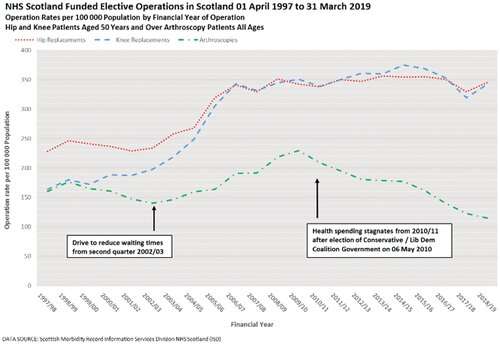Austerity may be worsening NHS waiting time inequality in Scotland

Scientists at Newcastle University analyzed three common elective surgery procedures, primary hip and knee replacements and knee arthroscopies, between 1 April 1997 to 31 March 2019. Hip replacements are commonly used to assess healthcare equity.
The Scottish NHS waiting time initiative was launched in 2002. The analysis shows that between 1 July 2002 and 31 March 2010 waiting time inequality between the most and least deprived patients fell. However, these gains were reversed between 1 April 2010 and 31 March 2019 during the period of austerity and budget cuts.
Inequality in mean waiting time for hip replacements increased by 1.07 days per quarter between 1 April 1997 and 30 June 2002; decreased by 1.26 days per quarter between 1 July 2002 and 31 March 2010; and increased by 0.58 days per quarter between 1 April 2010 and 30 June 2019.
Health inequalities
The analysis, published today in the Journal of the Royal Society of Medicine, was carried out by researchers at the Population Health Sciences Institute at Newcastle University.
Graham Kirkwood, Senior Research Associate, said: "The drive to reduce waiting times in Scotland from July 2002 had the effect of reducing inequalities between the most and least socioeconomically deprived patients. This finding held true for each of the three elective procedures analyzed: primary hip replacements, primary knee replacements and arthroscopies.
"Prior to this, for all three treatments, patients in the most deprived areas had longer waits than those in the least deprived areas. The introduction of austerity measures in 2010, with a real-term freeze on health spending, appears to have reversed the gains with waiting times increasing for all patients and the pre-2002 pattern of inequality returning."
The authors say further research is needed to analyze, compare and contrast the trends and effects of the use of the private sector on waiting time inequalities in Scotland with England.
Unlike Scotland, England has increased the proportion of elective surgery that is being outsourced from the NHS to the private sector under the patient choice program and the numbers of patients paying to go private has also increased.
More information: Graham Kirkwood et al, Socioeconomic inequality, waiting time initiatives and austerity in Scotland: an interrupted time series analysis of elective hip and knee replacements and arthroscopies, Journal of the Royal Society of Medicine (2022). DOI: 10.1177/01410768221090672


















